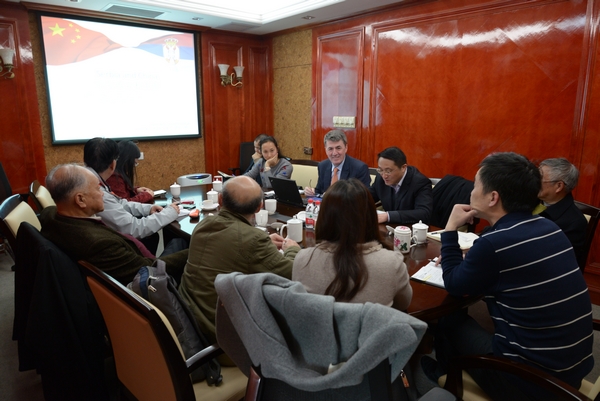On the afternoon of March 2nd, Prof. Zarko Obradovic, who is deputy chairman of the Socialist Party of the Serbia, member of the Serbian Parliament, and former Serbian Minister of Education, visited thee SIES and held discussions with a group of Shanghai scholars and experts, namely, WU Yikang, DAI Bingran, ZHANG Zuqian, CUI Hongwei, LONG Jing, XIN Hua, CAO Ziheng, YE Yuming, and YANG Haifeng. Prof. Obradovic analyzed Serbian foreign policy from the perspectives of geopolitics, history, and culture. He pointed out that, because of its central location in the heartland of Balkan Peninsula and the Southeast Europe as a dividing line between the east and the west, Serbia is neither a member of the NATO nor a member of the European Union, which is a rarity among the 16 Central and Eastern European countries, and implements an independent policy in political and military affairs. He further pointed out that Serbia has two major friends, China and Russia, and one major partner, the European Union, so it may act as a bridge for promoting the cooperation between China and the Central and Eastern European countries within the context of the “One Belt One Road” initiative. He suggested that China shall let local people of Serbia feel the substantial benefits of such cooperation through a series of large projects such as electricity power plants and railways, so that the China-Central and Eastern Europe cooperation may be pushed forward even further. He also advised that young students of both sides shall be exchanged for studies in each other’s universities so that they may deepen their perceptions and cognitions over the issues in reality. In fact, he himself has been promoting the China-Serbia cooperation in many fields. When he was on the post of Minister of Education, he helped to establish Chinese language courses in Serbian elementary and secondary schools. He also worked as the Serbian coordinator for the 16+1 mechanism and contributed to the launching of 56 China-Serbia cooperative projects, which sustained the China-Serbia traditional friendship that evolved from the age of Tito.


